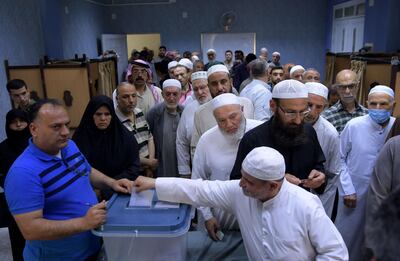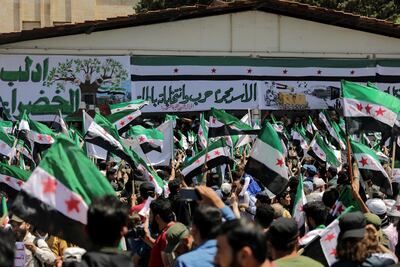Syrians voted in presidential elections on Wednesday with President Bashar Al Assad casting his ballot in the town of Douma in Eastern Ghouta.
The vote was the second since the start of the decade-long civil war that has killed more than 388,000 people and displaced half the pre-war population. It was the first election since Mr Al Assad regained control over most of Syria's governorates except Idlib and some north-western regions on the border with Turkey.
The US and EU said on Tuesday the election was "neither free nor fair", and Syria's fragmented opposition called the polls a farce.
Voting in Eastern Ghouta was a symbolic show of power by Mr Al Assad over the former rebel stronghold.
Douma was recaptured by government forces in 2018 after a Russian-backed military campaign helped the president force Jaish Al Islam, the rebel group that controlled the town, to retreat, following years of siege and daily bombardment.
News of Mr Al Assad touring the town with his wife, Asma– under strict measures by Syrian special forces and a Russian security team – sparked outrage among Syrian opposition supporters on social media; especially those who were forced to leave their homes in the Eastern Ghouta villages after the agreement with Jaish Al Islam.
"Residents inside and outside Douma were struck by the news. We recalled in a minute the 10 years of claiming freedom, protests, killing, bloodshed and the martyrs," Bayan Rehan, a prominent activist from Douma, told The National.
“Today we felt that we were slaughtered for the second time,” she said.
The town is also where a suspected chemical attack took place in April, 2018 prompting missile strikes by the United States, France and Britain against several suspected chemical weapons facilities in Syria.
The Syrian government and Russia deny involvement in any such attack.
"It is a black day in the history of the Syrians. A day when a criminal boasted of his victory amid the destruction as he stepped on the body parts of those he killed," Dr Sallom Ammura, who ran an underground hospital known as The Cave in Douma with several doctors, told The National from Turkey.
"I can't describe the feelings of oppression and the defeated spirit," he said.
Large election posters glorifying Mr Al Assad were installed across the two thirds of the country under government rule.
With opponents abroad barred from standing and no voting in the territory outside his control, Mr Al Assad faced two virtually unknown challengers.

The state news agency Sana declared voting had started as planned at 7am and state television showed long queues forming amid tight security.
Hundreds of students clamoured to vote outside Damascus University.
"I came to vote for Bashar Al Assad because he is the only man who withstood 10 years of war," said Kinan Al Khatib, 26.
Around him, students chanted the slogan used to express support for strongmen around the Arab world: "With our blood and with our souls, we sacrifice our lives for you, Bashar."
Syrians were casting their ballots at more than 12,000 polling stations, and results were expected to be announced by Friday evening, 48 hours after polls close.
The election took place amid the lowest levels of violence since 2011 – but with an economy in freefall.
More than 80 per cent of the population live below the poverty line, and the Syrian pound has plunged in value against the dollar, causing rampant inflation.
Mr Al Assad's campaign slogan, "Hope through Work", evoked the colossal reconstruction needed to rebuild the country, which will require billions of dollars in funding.
Mr Al Assad, 55, an ophthalmologist by training, was first elected by referendum in 2000 after the death of his father Hafez, who had ruled Syria for 30 years.

In Wednesday's election, he faced former state minister Abdallah Salloum Abdallah and Mahmud Merhi, a member of the so-called "tolerated opposition", long dismissed by exiled opposition leaders as an extension of the regime.
"I don't know the other candidates at all and I respect their nomination but my vote will definitely go to Al Assad," Mr Khatib said.
Mr Al Assad has not held campaign media events or interviews.
But he issued a general amnesty for thousands of prisoners earlier this month, on top of a series of decrees aimed at improving the economy.
Interior Minister Mohammad Al Rahmoun said on Tuesday that 18 million Syrians at home and abroad were eligible to vote.
Last week, thousands of Syrians abroad with the right paperwork cast early ballots at the country's embassies.
But those who fled the country illegally and so could not show an exit stamp in their passports, were barred from voting.
Several countries that oppose the Al Assad regime blocked the vote altogether, including Turkey and Germany, which are home to large Syrian refugee populations.















